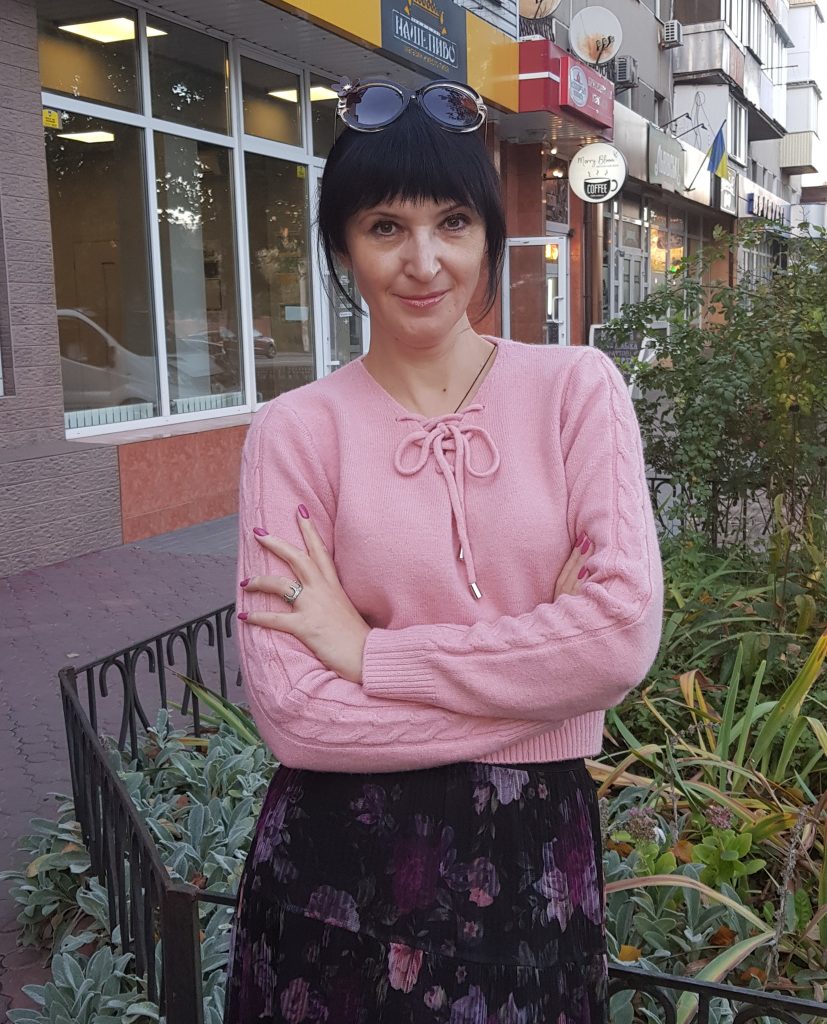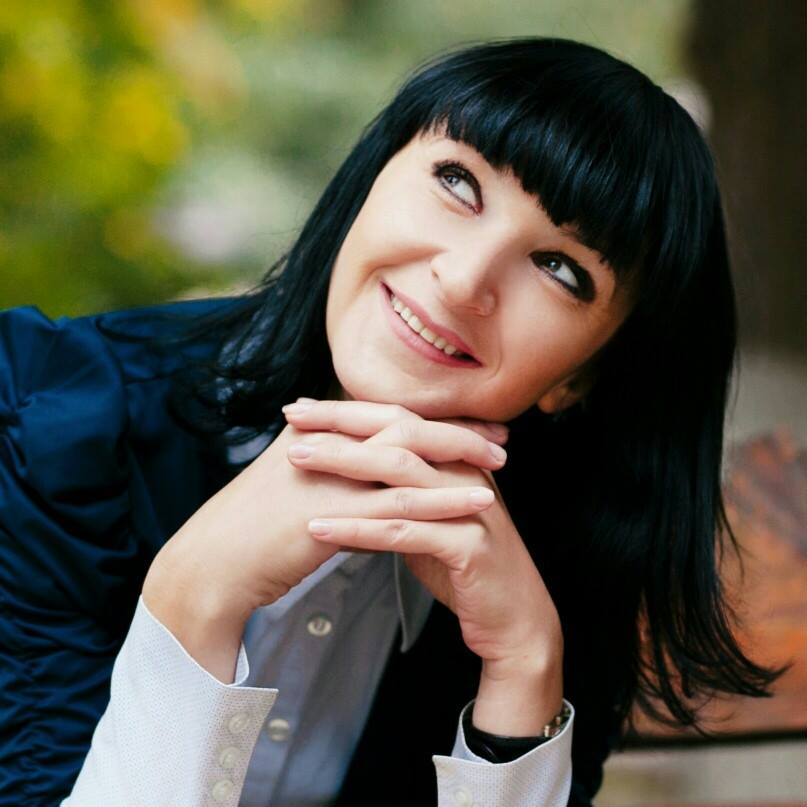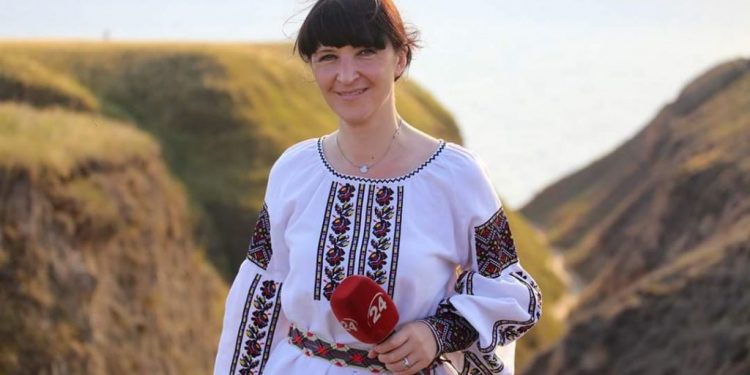Maryna Savchenko, a journalist for the “Novii Den” [New Day] website in Kherson and a correspondent for the “24 Channel,” initially hid from shelling and later from persecution. She spent several months living in occupied Kherson and could only leave after three attempts.
“Wake up, they’ve already bombed the military unit in Henichesk and hit part of Chornobaivka!”
Maryna learned about the start of the war on February 24 in the early morning. A friend called her and, instead of the usual greeting, shouted, “They’re bombing Henichesk!”
— She called and said, ‘Wake up, they’ve already bombed the military unit in Henichesk and hit the military unit in Chornobaivka! The war has begun!’ I didn’t believe her — Maryna began her story.
However, it didn’t take long to confirm the truth of those words because Kherson was next in line after Henichesk, facing bombings.
— We sat in the basement for three or four days. It was very frightening. We read the news that ‘rockets landed’ in Antonivka, and there were casualties. I came out of the basement, went on air, monitored the news, and reported on what was happening in Kherson, — the journalist said.
The war would later teach Ukrainians to stock up on food, water, batteries, and power banks, but at that time, chaos prevailed in Kherson, much like other cities along the front lines.
— I gave my brother fifteen hundred and sent him to the market. Prices were astronomical there. He brought back only a little food, but it saved us for a while — Maryna shared her memories.

Remaining Vigilant!
On March 1, the occupiers entered Kherson and immediately began hunting for patriots, activists, and journalists.
— I continued to go live until they kidnapped my colleague Oleh Baturin from the ‘Novii Den’ newspaper. Then I realized that it was dangerous and simply passed on information to the TV channel. But I started receiving calls too. We monitored where the calls were coming from and checked through a special program. It turned out they were calling from the self-proclaimed Donetsk People’s Republic (DPR). So, I kept only one phone number known to close people and turned off the one everyone else knew. One acquaintance from Kyiv wrote to me, ‘How are you doing?’ I was so terrified that I was afraid to reply, thinking, ‘What if he’s compromised, if he’s gotten into some situation, and it’s not really him? What if he’s in captivity?’ In occupation, you lose some control over yourself, and you’re afraid of everything, — Maryna recounted.
The journalist always tried to remain vigilant. Perhaps it was an automatic response, given her previous work in law enforcement. But intuition also told her that she needed to leave the city.
— At first, I tried to leave as if I were taking a regular bus; it was clear that the occupiers were making money from it. They allowed buses to go to Odesa. But our convoy was turned away. In the following days, they also turned others away; this route no longer worked. In my second attempt, I tried to leave on private transport. There was a practice where, for a fee, they transported expensive cars for those who had left earlier. To get through, it was advisable to have women or children in the car. Some acquaintances offered me a ride this way. Later, I regretted getting into that car because the occupiers constantly paid attention to it and constantly asked the driver where he got such an expensive car. We tried to pass through Davydiv Brid, but they turned us away, and no one was allowed through that road afterward.
Maryna felt true despair. Several attempts to leave Kherson had failed. What should she do next? At that moment, she learned that her colleague, journalist Oleh Baturin, had been kidnapped. She sewed her National Union of Journalists of Ukraine identification into her luggage lining and headed toward Zaporizhzhia. But would she make it this time?
— I left in three stages—from Kherson to Zaporizhzhia, then to Odesa, and finally to Vinnytsia. I immediately informed the ’24 Channel’ that I was already in government-controlled territory and could report on what was happening in occupied Kherson. The next day, I went live, — the journalist explained.

“Dreaming of Victory and Returning to Television”
During the war, Maryna and her team transformed the “Novii Den” newspaper. They created a Facebook page and a Telegram channel. However, her biggest dream is to hold a microphone once more.
— Journalism is a diagnosis. It doesn’t matter how much you earn; what matters is how you can help, — Mrs. Savchenko says. — We’ve changed, the country has changed—everything has changed. I’m 100% sure I’ll stay in journalism because it’s my calling. I can’t live without it. I dream of development, I want to return to TV. Without television, without a camera, without a microphone, I feel like I’m missing something essential. My dream is victory and a return to television.
This series, titled Executed Free Speech, is created as part of a project Drawing Ukrainian And International Audience’s Attention To Serious Violations Of Human Rights And Crimes Against Journalists And Mass Media By The Russian Federation, which is performed by the National Union of Journalists of Ukraine, with support from the Swedish non-profit organization Civil Rights Defenders.
JOURNALISTS ARE IMPORTANT. Stories of Life and Work in Conditions of War is a cycle of materials prepared by the team of the NUJU with the support of the Swedish human rights organization Civil Rights Defenders.
#CRD

 THE NATIONAL UNION OF
JOURNALISTS OF UKRAINE
THE NATIONAL UNION OF
JOURNALISTS OF UKRAINE
















Discussion about this post